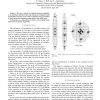244 search results - page 17 / 49 » Turing machines and bimachines |
MFCS
2000
Springer
13 years 11 months ago
2000
Springer
Abstract. A binary sequence A = A(0)A(1) . . . is called infinitely often (i.o.) Turing-autoreducible if A is reducible to itself via an oracle Turing machine that never queries it...
CEC
2007
IEEE
14 years 1 months ago
2007
IEEE
— We aim to search for cellular automata candidate to an automatic system for the demonstration of collision-based universality and that can be able to simulate Turing machines i...
IGPL
2006
13 years 7 months ago
2006
Since 1996, some models of recursive functions over the real numbers have been analyzed by several researchers. It could be expected that they exhibit a computational power much g...
MPC
2004
Springer
14 years 23 days ago
2004
Springer
Abstract. Erasure of information incurs an increase in entropy and dissipates heat. Therefore, information-preserving computation is essential for constructing computers that use e...
CORR
2010
Springer
13 years 4 months ago
2010
Springer
We define a new transfinite time model of computation, infinite time cellular automata. The model is shown to be as powerful than infinite time Turing machines, both on finite and ...

